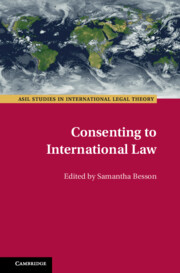Book contents
- Consenting to International Law
- ASIL Studies in International Legal Theory
- Consenting to International Law
- Copyright page
- Contents
- Contributors
- Preface
- Consenting to International Law
- Part I Notions and Roles of Consent
- 1 Consenting Is Not Willing
- 2 State Consent and the Legitimacy of International Law
- 3 Controlling Consent
- 4 International Organizations and the Disaggregation of Consent
- 5 Consenting to International Law in Five Moves
- Part II Objects and Types of Consent
- Part III Subjects and Institutions of Consent
- Index
1 - Consenting Is Not Willing
from Part I - Notions and Roles of Consent
Published online by Cambridge University Press: 23 November 2023
- Consenting to International Law
- ASIL Studies in International Legal Theory
- Consenting to International Law
- Copyright page
- Contents
- Contributors
- Preface
- Consenting to International Law
- Part I Notions and Roles of Consent
- 1 Consenting Is Not Willing
- 2 State Consent and the Legitimacy of International Law
- 3 Controlling Consent
- 4 International Organizations and the Disaggregation of Consent
- 5 Consenting to International Law in Five Moves
- Part II Objects and Types of Consent
- Part III Subjects and Institutions of Consent
- Index
Summary
The author argues that ‘will’ and ‘consent’ are different. According to him, no State’s will is entirely free. However, this does not preclude its consent from being valid. State consent displays different shades of will: while unilateral acts are the epitome of ‘willing consent’, the degree of willingness required when accepting a treaty is weaker, until it almost disappears in the case of custom, or general principles of law. The author argues that opinio iuris and consent are also different notions: you may feel legally bound even if consent is very remote. However, whatever role ‘will’ plays in the formation of rules, once the rules exist, States are, according to the author, bound and their will is trapped. The author makes the argument that, if neither will nor consent explain the basis of a State’s obligation when it is no longer willing to implement it, they nonetheless have a stabilizing and legitimizing role. He argues that consent makes the acceptability of the obligation stronger, by comforting its legitimacy, which also makes its implementation more effective.
Keywords
- Type
- Chapter
- Information
- Consenting to International Law , pp. 31 - 48Publisher: Cambridge University PressPrint publication year: 2023



